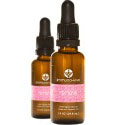An interesting and important book is has hit the market for all Informed Beauty's.
The Healthy Home is about the dangerous substances that we may be exposed to on a daily basis, and the simple but effective changes we can start making to help us reduce the toxic burden of living in the modern world. Love it!
If you want to look better, you have to take better care of your body on the cellular level. Here are seven things you can start doing today that will improve the way you look and feel, from the inside out.
Diet Your skin is your largest and most visible organ, yet it is the last to receive nutrients from the body. Keep your skin healthy (and looking good) by eating foods rich in protein and healthy fats. Healthy fats like monounsaturated and polyunsaturated fats, along with key amino acids and protein, are crucial for collagen formation and cell repair. Lean meats like chicken and fish, along with avocado, nuts, and olive oil, provide these critical nutrients. Additionally, foods high in antioxidants, such as dark berries and leafy greens, help fight against free radicals that cause oxidative damage to your cells.
Water Aside from eating right, you should also stay hydrated. Why? Your body is made up of more than 10 trillion cells, and they all need water to operate at an optimal level. Water helps your cells keep their shape, and acts as a conduit for healthy, necessary biochemical processes within your cells to take place. Our bodies are more than 60 percent water, so replenishing lost fluids throughout the day is necessary for healthy cells and glowing, healthy skin. There are many sports drinks and fruit juices out there claiming to “rehydrate,”but purified water is best. Drink eight to 12 eight-ounce cups of water a day.
Supplements If you are like the average American adult, you are not getting the nutrients your body requires to function at its best. Poor eating habits consisting of processed, fatty, sugary foods can lead to many health concerns, including erratic blood sugar levels and obesity. Even if you try your best to eat the freshest fruits and vegetables, you are probably still lacking several key nutrients because it’s difficult to consume the amount of nutrients your body needs to function properly with food alone. To help ward off malnutrition, supplement a healthy diet with high-quality vitamins and minerals. Studies show that synergistic vitamin and mineral blends yield better results than taking individual nutrients on their own.
Every body is different, so start with a high quality multivitamin or vitamin pack and then customize additional nutrients as needed. And remember: it could take several months of consistently taking your vitamins to see visible results. Just know you’re doing your body a favor by giving it exactly what it needs to function at an optimal level.
Sleep There is a reason it’s called “beauty sleep.” Getting quality rest in a good quantity — 6–8 hours — every night gives your body and mind a chance to recuperate from the stresses of the day. But this is also the time when your cells repair themselves. If this process is disrupted, it will show on your face through puffiness, dark circles, and uneven skin tone. If you have trouble falling asleep, there are a few natural options. A melatonin supplement can work with your body’s natural melatonin production to help you achieve optimal rest for renewed energy. Try incorporating a repetitive habit into your daily bedtime routine to help mentally trigger your brain to shut down for the night. Reading is one such activity. Regular exercise can also improve the quality of your rest. Speaking of exercise. . .
Exercise Regular cardiovascular and strength training will not only help you feel better; it will help you look better too. Regular exercise can boost your mood and improve your sexual drive, and sweating during exercise helps cleanse your pores of toxins to reveal brighter, healthier-looking skin.
Quit Smoking Smokers are basically asking their skin to age faster. Nothing damages your skin and overall health more. According to the Mayo Clinic, “Smoking narrows the tiny blood vessels in the outermost layers of skin, which decreases blood flow. This depletes the skin of oxygen and nutrients, such as vitamin A, that are important to skin health.”Smoking also reduces your skin’s elasticity, which will increase those lines on your forehead and around your eyes. http://www.mayoclinic.com/health/skin-care/SN00003 Stop Stressing It may be hard to believe, but the mental strain caused by stress can also tax the body. Excessive stress can lead to all sorts of damage, including high blood pressure and heart disease. But it also causes skin damage, including wrinkles and breakouts. Managing your stress correctly can produce positive results on how you look and feel. Even just a few minutes of silent meditation or deep breathing can help calm and de-stress the body and the mind.
One Last Thought Your skin will eventually age — that is inevitable. But simple steps like the ones listed above can keep the signs of aging at bay for as long as possible.
It’s also important to remember that not all skin care products are made with the highest quality ingredients and are best for your skin. Stay away from products that contain harsh chemicals and preservatives that actually speed up the aging process and will eventually cause more harm than good. Remember, your skin is the last organ to receive nutrients from the body and often the first to show signs of nutritional deficiency. Proper nutrition and a well-balanced diet are truly the key factors for overall health and beauty.
© 2011 Dr. Myron Wentz and Dave Wentz, authors of The Healthy Home: Simple Truths to Protect Your Family From Hidden Household Dangers
Author Bios
Dr. Myron Wentz , author of The Healthy Home: Simple Truths to Protect Your Family From Hidden Household Dangers, holds a Ph.D. in microbiology with a specialty in immunology from the University of Utah. He founded Gull Laboratories in 1974 and developed the first commercially available diagnostic test for the Epstein-Barr virus. Later, he founded USANA Health Sciences andSanoviv Medical Institute. Dr. Wentz was honored in June 2007 with the Albert Einstein Award for Outstanding Achievement in theLife Sciences. He is the author of A Mouth Full of Poison and Invisible Miracles. He travels the world with his lovely partner, Prudence.
Dave Wentz , author of The Healthy Home: Simple Truths to Protect Your Family From Hidden Household Dangers, is chief executive officer of USANA Health Sciences, a state-of-the-art manufacturer of nutritional supplements and health products. He received a bachelor’s degree in bioengineering from the University of California, San Diego. Dave lives with his wife, Reneé, and children, Andrew and Sydney, in Salt Lake City, Utah, where he enjoys skydiving, playing volleyball and soccer, mountain biking, and skiing Utah’s famous powder. For more information please visit http://www.myhealthyhome.com/









